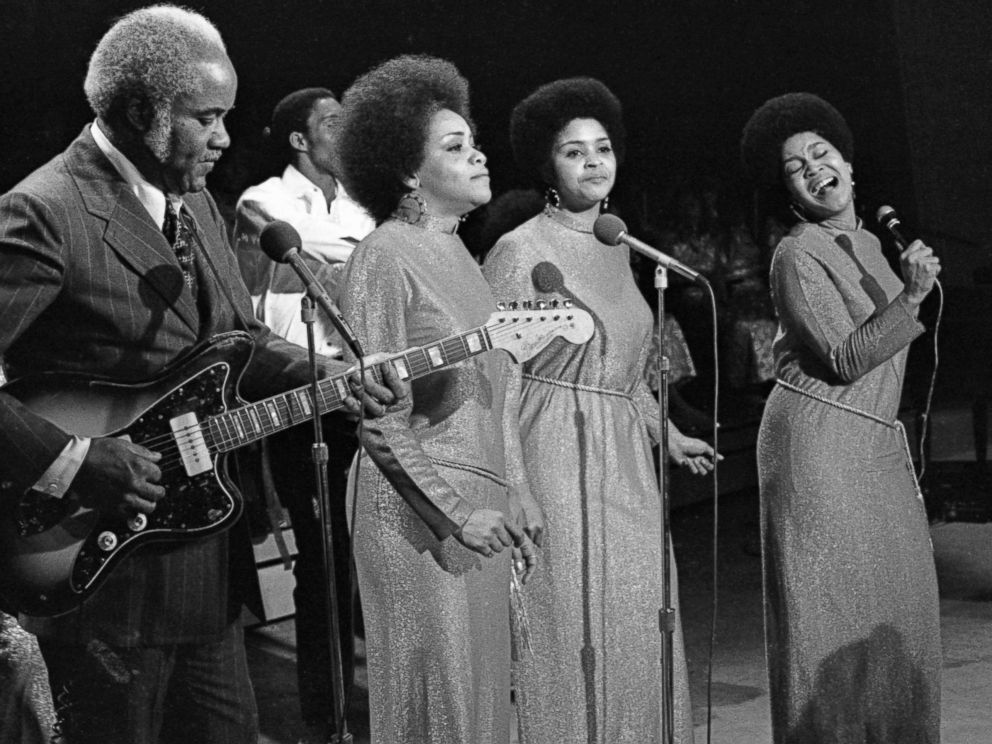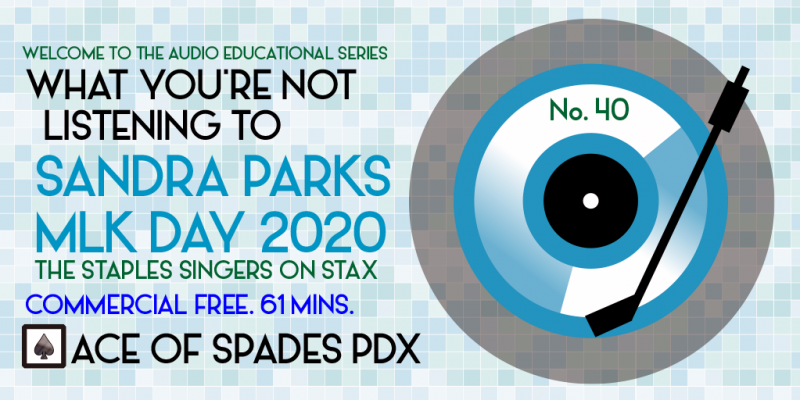Podcast: Play in new window | Download | Embed
Featuring the Rock and Roll Hall of Fame inductees in tribute for the late Sandra Parks on Dr. King’s birthday. #sandraparks #endgunviolencetogether #MLKDay #staplesingers #stax #cnn #brookebaldwin #blacklivesmatter
The observance of Dr. Martin Luther King’ Jr.s birthday held annually in January is meant to be a celebration of his legacy. I am marking this day for a young lady who invoked his messages of peace, love and unity with another group of people who also spoke the truth to power. These people are Sandra Parks and The Staple Singers.

In 1972, while appearing on the television program Soul Train, host Don Cornelius asked guitarist and vocalist Roebuck “Pop” Staples if he believed Gospel and the truth meant about the same thing. Staples replied that “Gospel ain’t nothing but the truth.”
Starting out a traditional Gospel act in the late 1940’s, the Staple Singers (they dropped the second “s” at the end of their surnames professionally) comprised of Pop and his children, Pervis, Cleotha and Mavis. His youngest daughter, Yvonne, was the group’s secretary. The group found success singing songs such as “Uncloudy Day”, a huge influence on a very young Bob Dylan.
“For evil to succeed, all it needs is for good men to do nothing.”
Dr. Martin Luther King Jr.
By the 1960’s, they would record for various labels, singing Gospel and R&B songs, and were even the very first act to record songs by the aforementioned folk singer Dylan. By the early 1970’s, however, they were recording what were once called “message songs”, tracks that were topical in nature and spoke to the legacy of what the recently assassinated Dr. King wished for us all. Also at this time, Pervis left the group to focus on managing other artists, and Yvonne stepped in to the line-up.
After some intervention by the label they had signed to during this period, Stax, out of Memphis, TN, their president Al Bell recorded the group with session players known for producing some of the best R&B and Soul records of the era. This started a string of million-selling gold records for the group, being one of the few groups to merge all of their distinctive influences with songs that spoke directly to the problems of Black people looking for solutions.

Sandra Parks was hit by a stray bullet in her home in the fall of 2018. She was only 13 years old. Two years earlier, she had written an essay which, after reading it, made me think directly back to the period of time and content of the music we are listening to today.
This MLK Day 2020 program is dedicated to the memory of the late and far too young Ms. Parks and the legacy of one of the most honest groups in all of recorded history, The Staple Singers. Take this day to make some type of positive change in the world, no matter how small you may think it is. In the words of Dr. King himself: “For evil to succeed, all it needs is for good men to do nothing.”
First Part
- If You’re Ready (Come Go With Me)
- Love Is Plentiful
- Long Walk to D.C.
- Heavy Makes You Happy (Sha-Na-Boom-Boom)
- Tupelo, Part 1 (Pops Staples with Steve Cropper and Albert King)
- Whicha Way Did It Go
- When Will We Be Paid
- This Old Town
Second Part
- Brooke Baldwin of CNN reads the essay “Our Truth” by Sandra Parks live on air
- Respect Yourself (full-length album version)
- City In The Sky
- We’ll Get Over
- Oh La De Da (studio recording with live overdubs)
- The Ghetto
Finale
- I’ll Take You There (full-length album version)
Love to you all.
Ben “Daddy Ben Bear” Brown Jr.
Host, Producer, Audio Engineer, Researcher, Webmaster and Writer
“Copyright Disclaimer Under Section 107 of the Copyright Act 1976, allowance is made for ‘fair use’ for purposes such as criticism, comment, news reporting, teaching, scholarship, and research. Fair use is a use permitted by copyright statute that might otherwise be infringing. Non-profit, educational or personal use tips the balance in favor of fair use.”
